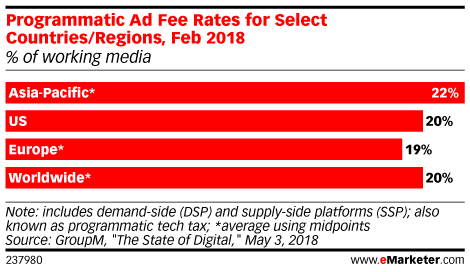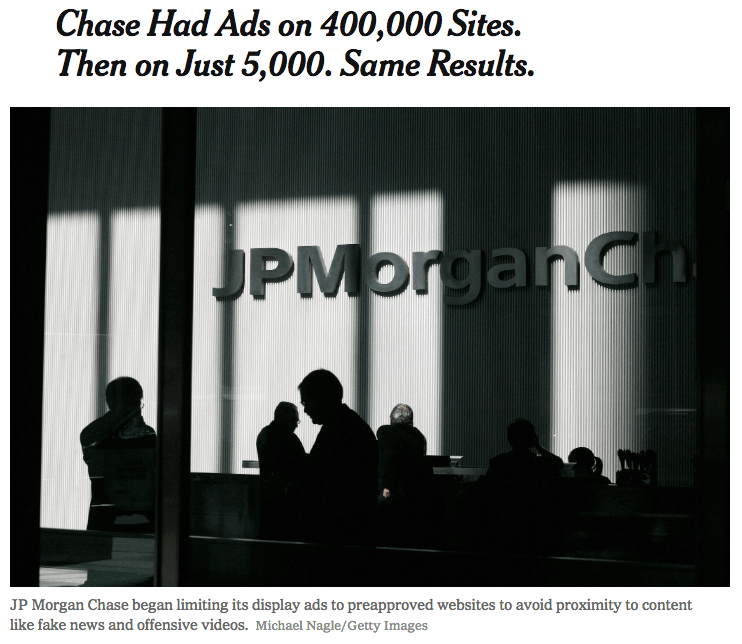It can be daunting for brands when they first step into the bright and promising world of Adtech, Artificial Intelligence (AI), and machine learning. There are a lot of red flags you’ll want to avoid and make good budget decisions.
There are many digital ad agencies that hide behind jargon, complex tech and bad practices that bank on brands not knowing these incredibly important aspects of the online ad business.
As an agency that specializes 100% in programmatic and over a decade of experience in the industry, we’re here to spill the tea and discuss:
The Disadvantages of Programmatic Advertising
From fraud, to bots, to outrageous pricing structures – we will make sure that by the end of this post you know what to look for and expect from an honest, quality programmatic ad agency. You will learn about the ways unethical programmatic agencies operate, what problems you stand to face and how to avoid these risks in the future!
Here are the topics we will cover:
- How The Adtech Industry Cashes In on Ignorance
- The Problems You Face With Programmatic Advertising
- Why Measurement isn’t Consistent at Some Agencies
- How Lack of Agency Transparency Costs You Money
- How a Lack of Third Party Visibility Harms Your Ad Campaigns
- The Reality of Ad Fraud in the Industry
- Why Viewability of Ads is a Cause for Concern
- How Brand Safety Should Be Your Main Priority
- How to Choose an Ethical Digital Advertising Agency
- TL;DR – What Have We Learned
Editor’s Note: Be sure to check out our comprehensive posts on programmatic:
How The Adtech Industry
Cashes In on Ignorance
You’ve probably heard a lot about the benefits of programmatic advertising.
The media loves to seize anything with futuristic technology and turn it into the latest must-have.
That’s why you see everyone from Fortune 500 brands to small mom and pop stores investing nearly all of their ad budgets into programmatic ads.
And you know what – they don’t all suddenly experience transformative growth.
There is one thing in particular, that unscrupulous ad agencies get away with. They do this daily and it’s a gross misuse of their client’s ad budgets.
Worse still, if you don’t know what to look for, you would never even know it’s happening, which we’ll tell you more about it a little later in the post.
First, there are 3 things you need to agree with before we continue.
- Doing business with any Demand Side Platform (DSP) or agency without proper orientation on good practices and what they look like is a bad idea.
- Programmatic advertising is based on new technology, so yeah – there are going to be adjustment issues. Some companies factor this in for their clients’ benefit; other companies exploit the knowledge gap for financial gain. It’s best to know who is who.
- Technology is only as good as the team managing it. You can have the most advanced platform in the world, but if you can’t trust your ad team, you’re not going to maximize your ad campaigns’ potential.
As a player in the industry, we don’t like to see other programmatic advertising companies cashing in on the ignorance of brand marketing teams.
Let’s take a look at the disadvantages of programmatic advertising and get to the core of what makes a healthy, successful ad partner relationship work and negate these risks for your brand!
The Problems You Face With Programmatic Advertising
Martin Cass – CEO of MDC Media Partners and Assembly – did a talk on it a while ago, exposing Adtech as ‘the Wild West’ – a landscape brimming with problems.
We believe the Wild West perfectly describes what the industry is currently experiencing. There are hordes of settlers, like your brand, looking for the promise of a better future.
Programmatic advertising, AI, and machine learning is a new frontier – exciting but ultimately in its infancy. You have good guys and bad guys. Sheriffs and bandits. It makes sense.
In this space, size and past reputation are no guarantee of smart, fair service.
We all have guns now, and it’s a gunfight.
People who get the raw deal are almost always the settlers, unfortunately. Not the bandits getting rich off robbing and exploiting others.
Clients suffer most — which doesn’t sound like a sustainable business model.
There’s no denying the landscape has irrevocably changed forever. Here you are, and where you’re likely to stay. But let’s not ignore the problems you’re facing.
According to a survey, senior ad buyers have identified several key concerns that are happening right now in the Adtech industry.
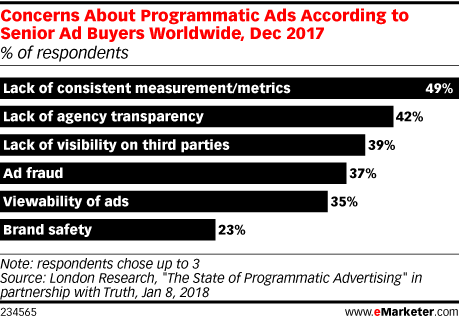
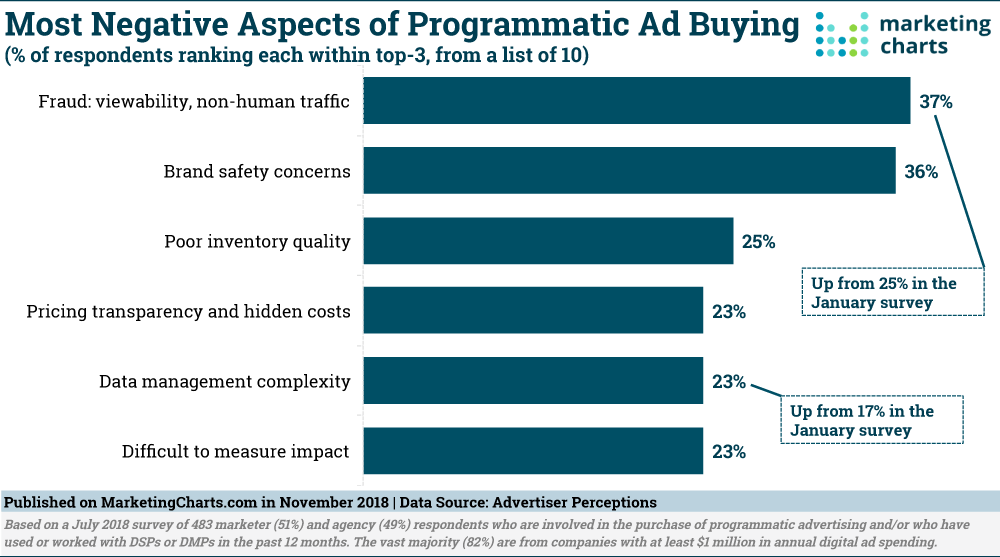
Among the most prevalent concerns are consistent measurement, agency transparency and viewability of ads. We’re going to address each of these disadvantages of programmatic advertising, one by one.
Why Measurement isn’t Consistent at Some Agencies
According to The State of Programmatic Advertising report,
- Advertising teams aren’t sure which metrics to measure
- Teams aren’t sure which metrics carry the most weight
- Getting fair Return on Investment (ROI) is easy which makes teams ignore optimization
- There is a high turnover of programmatic ad employees at most companies
This is quite a revealing statistic considering measurement is why programmatic media buying is so popular and such a promising technology.
Performance optimization is challenging in all marketing areas, but when you throw in proprietary technology that uses artificial intelligence and machine learning, things get complicated.
Programmatic advertising companies spring to life purely because the demand for them is so high. The result, of course, is non-specialist teams working with technology they don’t really understand.
Inconsistent measurement happens because:
Measurement is a problem everywhere in marketing >right now.
There is a well-known data scientist shortage, which means the industry lacks the ability to effectively measure and glean actionable insight from the vast quantities of data out there.
- 4 in 10 companies cite lack of analytical skills as a key challenge
- The US needs 1.5 million more managers and analysts working with big data
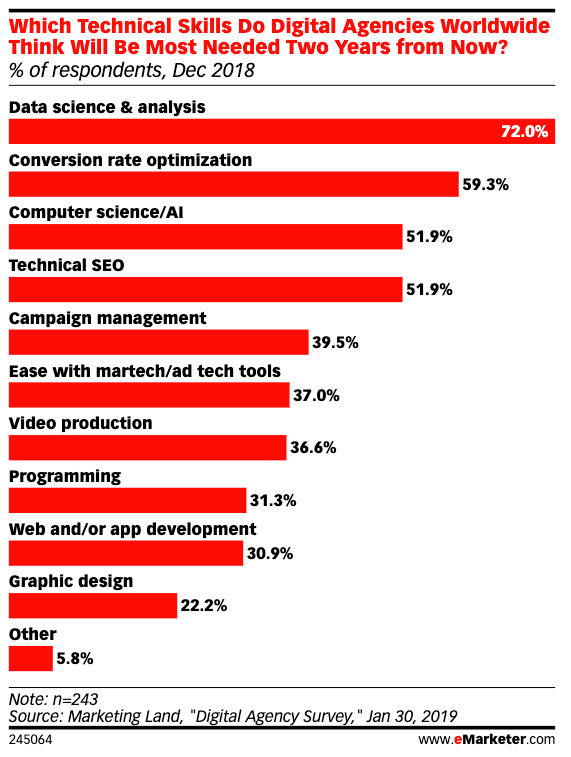
There is a direct correlation between the ongoing measurement problems in digital advertising and the lack of data science and analysis skills present in the industry.
Needless to say, you find a lot of programmatic agencies with teams who are undertrained and lack the technical, analytical skill required to measure ad metrics effectively!
Programmatic advertising is a highly specialized field that demands these skills so that advertisers can deliver on the promises of new technology.
How Lack of Agency Transparency Costs You Money
So, one of the biggest disadvantages of programmatic advertising is: the lack of transparency in pricing and costs.
This is the #1 way agencies take advantage of their clients and misuse your ad budget. We said we would spill the tea, so here goes.
When programmatic first emerged a few years ago, there were very few standards and controls in place, which meant that middlemen – like your agency DSP’s – could inflate costs.
Tragically, many programmatic advertising companies saw this as an opportunity to cash in. These agencies were taking 40-65% of their clients ad spend in ‘hidden fees.’
Buried deep in the bowels of overly complex contracts, were clauses that made this perfectly legal. Unethical, yes – but legal. And clients didn’t know any better.
Murky fees, restrictions and knowledge walls made it possible for these digital agencies to take 25 cents on every ad dollar. As it does, this all came to light a couple years ago.
Programmatic technology is incredibly transparent, even if some agencies are not. Slowly, the tech tax is lifting and now the average ad fees hover around 20% in the US.
How a Lack of Third Party Visibility Harms Your Ad Campaigns
Did you hear about JPMorgan Chase and their ads that ran on a site called ‘Hillary 4 Prison?’
The ad ran just beneath a prominent headline that claimed Elijah Wood spilled the beans on Satanic liberal perverts who run Hollywood. It was a fake news site, and a PR nightmare.
And it happened because the programmatic ad buying agency they used bought cheap impressions.
Programmatic advertising has created a world of fake news sites that amass large audiences by publishing total rubbish. These sites create big revenues with their ad space.
For advertising clients, this poses a particular risk for brand safety. Even though you want your ads seen by loads of people, you don’t want them associated with low quality spam sites.
The good news is that there are steps you can take to prevent this from happening. Blacklisting, whitelisting and working with ad teams knowledgeable about ad fraud is key to prevention.
This is another example of why partnering with the right DSP or programmatic ad company is so important. These teams execute strategies for you, and they impact your brand reputation.
A programmatic agency committed to transparency will send you monthly reports, and disclose exactly how and where your ads were served.
The Reality of Ad Fraud in the Industry
You see the problem – if you base your Return On Investment (ROI) on impressions, or just views, it’s easy to fake them. If your ad agency isn’t addressing these concerns, something is wrong.
According to a Bad Bot Report, 38% of all online traffic during 2018 were from bots. Some of them are good, and some contribute to escalating digital ad fraud in the programmatic space.
The bottom line is that fraud costs advertisers billions in revenue every year.
Your programmatic advertising company should be taking steps to reduce fraud, so that your campaign data is more accurate. That way your ROI will be higher and easier to replicate.
Among the steps you should check on are whether your DSP works with verification vendors, and if they’ve implemented Ads.txt to minimize bot responses.
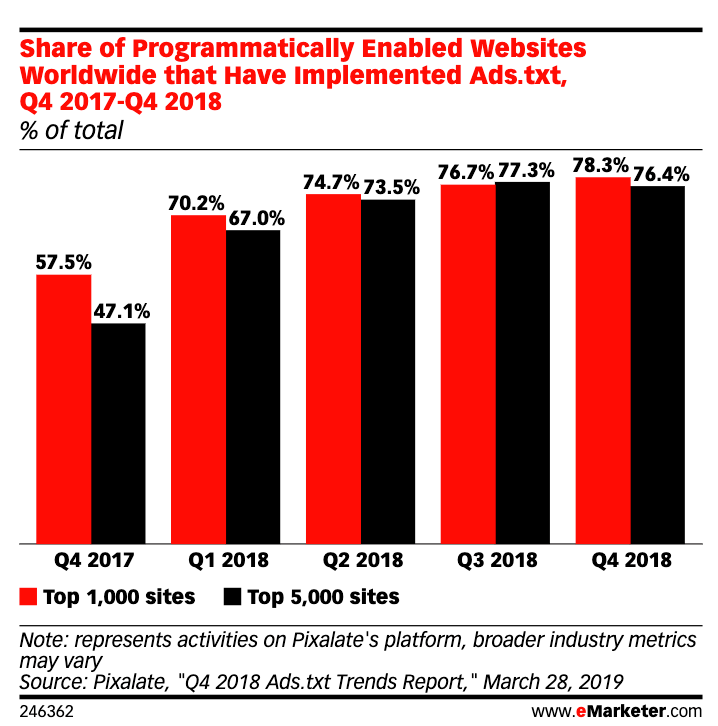
As you can see from the graph above, many – but not all sites use Ads.txt so checking if it is being used is a good idea for your brand.
Why Viewability of Ads is a
Cause for Concern
As an advertiser, you want people to see your ads.
More to the point, you only want to pay for ads that have the potential to be seen. This means making sure that your money is being spent on the best possible ad inventory.
Ethical, competent programmatic advertising companies make sure that your ads are shown to relevant, highly targeted, likely-to-act audiences.
This requires a blend of programmatic strategies, across multiple platforms – involving direct and omni-channel buys.
Viewability is a key metric when understanding ad ROI. And it’s a complex metric attached to so many other areas of programmatic media buying.
Things like audience targeting, context, and platform choices determine if your ads are being seen by the right people, at the right time in the right place.
In many ways this issue goes hand-in-hand with the measurement issue. Understanding metrics, what to measure and what constitutes an ethical view is part of the process.
According to IAB’s South East Asia Viewability Report, one of the few done on industry viewability rates in the world – ads are viewed about 53% of the time.
It’s important to note that few standards exist for platform variations. For example, a person scrolling on Facebook who stops to watch an in-stream ad has higher value than say – a display ad.
The views however, are measured the same way and given comparable weight.
How Brand Safety Should Be Your Main Priority
We’ve already mentioned what happened to JPMorgan Chase – and these sorts of issues crop up everywhere, especially on social media.
Facebook and Twitter are hotbeds of controversy, and they have the power to bring a large brand to its knees if audience sentiment changes.
It’s important that your audience trusts your brand. That means you need to take a hard look at your programmatic ads and how you’re creating your ROI.
- Where you place your ad matters! You can be guilty by association/affiliation
- What is the tone of your content? Negative content causes a 2.8X reduction in consumer intent to associate with your brand
- You need to avoid inappropriate, illegal, fake or scam content
The Interactive Advertising Bureau, (IAB) has gone to great lengths to educate advertisers about brand safety, outlining categories that they can avoid to minimize harm, and amplify brand safety for clients. They listed these 13 categories as what advertisers should avoid to ensure brand safety:
- Obscenity
- Drugs
- Tobacco
- Military conflict
- Arms
- Adult
- Crime
- Death/Injury
- Online privacy
- Hate Speech
- Terrorism
- Fake News
- Spam/harmful sites
How to Choose an Ethical Digital Advertising Agency
So you see, brands in the programmatic ad industry are heavily reliant on the teams that they choose to hire.
The wrong partner exposes your company to the potential of misuse of your budgets, ad fraud and campaigns that aren’t correctly measured or optimized. It can be a minefield.
It’s time to say no to the disadvantages of programmatic advertising.
What makes the real difference for brands are: human intervention, strategy and ad expertise.
With this in mind, we’re going to give you 4 quick and easy steps that you can use to choose a competent programmatic agency.
Step #1: Explore Their Business Model
A digital marketing agency that has ‘programmatic advertising’ as a tacked-on service is less likely to know what they’re doing, or have a specialist team doing it.
Full-service agencies are great, but honestly – they’re not a good investment. If you need programmatic ad buys, you have to look for a company built for this purpose.
We have a blog that covers the differences between Marketing Agencies and Advertising Agencies.
Step #2: Look at Their Results
Before engaging in meetings or hefty team schmoozing sessions, look at the company’s results. Ask for case studies or testimonials. Programmatic advertising is results-driven, so if they don’t have any, that’s a red flag.
Also take note of the level of success they achieve for their clients, and if their clients have been happy working and collaborating with their team.
Step #3: Ask About Their Team
Is their team made up of digital marketers or data scientists? Don’t be afraid to ask probing questions about how they hire their account staff.
These are the individuals that will be managing your brand on the internet. You want to know they’re educated, experienced, and have impeccable track records with data analysis.
Step #4: Ask How They Address Industry Problems
You’ve just learned about all the key issues facing programmatic advertising. Your chosen company should not only be aware of these issues, but actively working to combat them.
Chat about transparency, measurement, brand safety, ad fraud and viewability to get a strong idea on how they approach these important challenges.
Key Takeaway:
Choose a programmatic advertising agency with:
- The right business model (one that specializes in programmatic ad buys)
- A track record of successful programmatic ad campaigns
- An educated team that understands data analytics and strategy
- A working solution for every industry problem
We hope you feel more orientated on the challenges and disadvantages of programmatic advertising. It’s important to understand what your brand team could potentially face in the ad tech space.
There is always going to be a certain level of mystery when it comes to programmatic advertising. The best you can do is to partner with responsible programmatic advertising companies that have your best interests at heart!
When you do, you’ll find the promise of programmatic ads easier to understand and reach for. That means you’ll be the settler that eventually strikes gold in the Wild West (and doesn’t get shot in a dusty back alley after hitting the saloon)!
What Have We Learned?
Disadvantages of Programmatic Advertising:
- Some agencies cash in on client ignorance around ad tech
- Inconsistent measurement and metrics of data
- Lack of agency transparency (pricing and hidden costs)
- Lack of visibility on third party sites
- Ad fraud<
- Viewability of ads
- Risk of Brand safety
- Bot Traffic
- Poor inventory quality
That doesn’t mean programmatic ad tech can’t be cost-effective and drive performance-driven results. You need to look for trust-worthy programmatic agencies that are experienced and transparent.
Here are important factors to look for in a programmatic advertising agency to team up with:
- Ensure they have the technology stack and human expertise
- Make sure the team is experienced in strategy and data analytics. They should have digital marketers and data scientists on the team
- Make sure there is transparency in pricing. No hidden fees and know that your ad budget is actually being spent on buying ad space and not on tech tax
- Get a good understanding of your chosen agency’s strategies, methods and processes.
- See if they have a good track record when it comes to client projects. Ask to see their portfolio or case studies to determine if they’re a good fit for you
- Double-check that your ad partner is proactively helping you reduce ad fraud activity in your campaigns. That way you can receive accurate data for insights and better return on investments
- Viewability of ads is an ongoing issue in the programmatic space, so be sure that your partner actively works on solutions for this
- Brand safety is incredibly important for your business and it should be for your ad partner too. Make sure your ads are being managed and delivered properly and don’t be afraid to ask to see what your ads look like and where they are served









